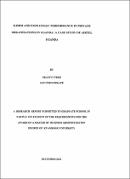| dc.description.abstract | The purpose of this study was to examine the relationship between E-HRM function and
performance of employees at Airtel Uganda. The study objectives were to assess the
relationship between E-recruitment, E-appraisal management system, E-learning/training
management and performance of employees in private organisations.
A case study design was used for this study and 132 respondents participated.
Respondents were selected using purposive and simple random sampling techniques and
contacted using questionnaires and interviews guides. Data collected was analyzed using
descriptive statistics and inferential statistics
Results revealed a strong positive relationship between e-recruitment and employee
performance evident in the way by which e-recruitment affected employee performance
indicators of work place interest and motivation (r = 0.367) cooperation and teamwork
(r =0.458) and with timely service delivery by r = .0526). Like many other organisations,
Airtel Uganda carried out performance appraisal of its employees regularly, and one of
the approaches was e- appraisal. A strong positive relationship was established between
e-appraisal and employee performance based on how e-recruitment related with key
employee performance indicators of employees' work place interest and motivation (r =
0.192), e-appraisal and employee cooperation and teamwork (r =0.571) and e-appraisal
with timely service delivery (r = 0.363). &training and learning had a positive
relationship with employee performance levels. E-training/learning was related with
workplace interest and motivation, cooperation and teamwork and timely service delivery
by (0.396, 0.338, and 0.496) which were basic measures of employee performance.
On the basis of the findings, it was recommended that there is a need to have a clear
policy regarding e-recruitment at Airtel Uganda, give attention to the content and scope
of e-training offered to employees especially those pursued on-line, network with
institutions that offer these courses and devise a strategy of encouraging employees to
pursue e-training and learning courses since it was established in the study that a large
number of employees were not interested e-learning. It was also recommended that a
research be conducted on the influence of e-selection and e-compensation on employee
performance in private organizations in Uganda. | en_US |

